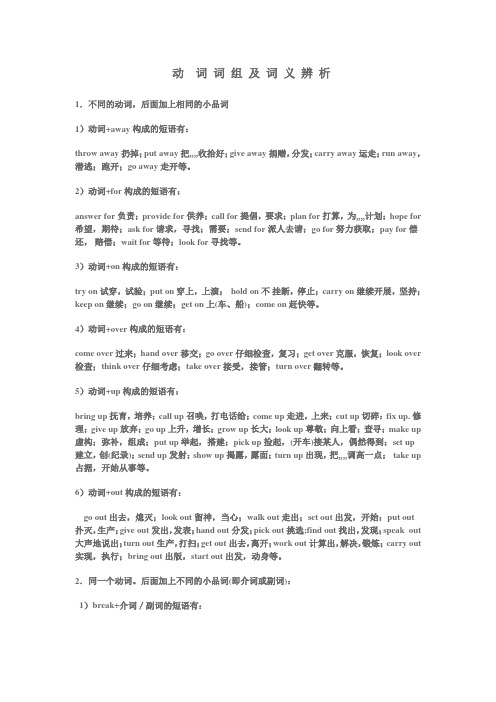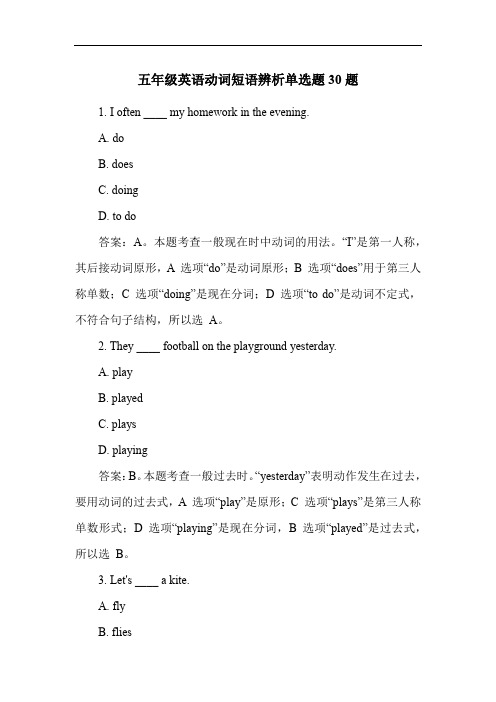动词短语辨析
重难点08 动词和动词短语-2023年中考英语【热点重点难点】专练(全国通用)(解析版)

专项一词汇重难点08动词和动词短语1.实义动词1.1.常考动词的用法辨析(1)look,see,watch,read的区别:(3)borrow,lend,keep的区别:1.2.及物动词和不及物动词(1)及物动词:可接单宾语、双宾语和复合宾语结构。
When someone gives me money, I feel they don't think at all.give后接双宾语(间接宾语+直接宾语)当有人给我钱时,我感觉他们根本就没有思考。
We elected him monitor of our class.elect后接复合宾语(宾语+宾补)我们选他当我们班的班长。
(2)不及物动词:不及物动词后面一般不可以直接接宾语,但有时不及物动词和介词或副词一起使用,构成动词短语,此时其后可以接宾语。
What will happen without electricity?没有电,会发生什么?I'm waiting for the bus.我正在等公交车。
1.3.延续性动词和非延续性动词(1)延续性动词表示一种可持续的行为过程或状态,可以和表示一段时间的状语连用。
而非延续性动词表示行为或过程在短暂瞬间内完成,不可以和表示一段时间的状语连用。
The film has been on for ten minutes.电影已经开始10分钟了。
The film began ten minutes ago.电影10分钟之前就开始了。
(2)延续性动词和非延续性动词的转换:连系动词指连接主语和表语的动词,主要用来说明主语的身份、性质、特征或状态。
连系动词只有主动形式。
2.助动词助动词本身没有词义或意义不完整,不能单独作谓语,只能和实义动词一起构成谓语,表示时态、语态、语气等,帮助构成否定、疑问、强调或省略等。
3.1.助动词be的用法be用作助动词和用作连系动词一样,有人称、数和时态的变化,主要用来构成进行时态和被动语态。
易混动词(短语)辨析(8份)

一、易混动词(短语)辨析。
1. used to do, be used to doing, be used to doused to do sth表示“过去常常做某事”。
be used to doing sth表示“习惯于做某事”。
be used to do sth表示“被用来做某事”。
2. arrive, get, reacharrive in+大地点;arrive at+小地点。
get to+地点名词。
reach是及物动词,后面直接跟地点名词。
3. borrow, lend, keepborrow“借”,终止性动词,表示主语“借入”某物,常用短语borrow sth from sb。
lend“借”,终止性动词,表示主语“借出”某物,常用短语lend sth to sb。
keep“保存,借”,延续性动词,表示“长时间地保存”。
4. dress, put on, wear, be in, have ondress +人,表动作。
put on+衣服,表动作。
wear+衣服/首饰,表状态。
have on+衣服,表状态。
be in+衣服/颜色,表状态。
5. see, look, watch, readsee“看见”,表结果。
watch “看(比赛,电视)”,表动作, 及物动词。
read “阅读(书籍,报刊)”,表动作。
look“看”,表动作;不及物动词,后面须加介词才能跟宾语。
6. bring, take, carry, fetchbring“带来,拿来”,表示拿到靠近说话者的地方。
take“带走,拿去”,表示拿到远离说话者的地方。
carry“扛,搬”,用力移动,没有方向性。
fetch“去取,去拿”,表示往返取物。
7. join, take part in, attend 三个词都有“参加”的意思。
join一般指加入党派或组织,如参军,入党等。
take part in 指参加聚会或活动。
attend一般指出席会议。
动词词组及词义辨析

动词词组及词义辨析1.不同的动词,后面加上相同的小品词1)动词+away构成的短语有:throw away扔掉;put away把……收拾好;give away捐赠,分发;carry away运走;run away,潜逃;跑开;go away走开等。
2)动词+for构成的短语有:answer for负责;provide for供养;call for提倡,要求;plan for打算,为……计划;hope for 希望,期待;ask for请求,寻找;需要;send for派人去请;go for努力获取;pay for偿还,赔偿;wait for等待;look for寻找等。
3)动词+on构成的短语有:try on试穿,试验;put on穿上,上演;hold on不挂断,停止;carry on继续开展,坚持;keep on继续;go on继续;get on上(车、船);come on赶快等。
4)动词+over构成的短语有:come over过来;hand over移交;go over仔细检查,复习;get over克服,恢复;look over 检查;think over仔细考虑;take over接受,接管;turn over翻转等。
5)动词+up构成的短语有:bring up抚育,培养;call up召唤,打电话给;come up走进,上来;cut up切碎:fix up. 修理;give up放弃;go up上升,增长;grow up长大;look up尊敬;向上看;查寻;make up 虚构;弥补,组成;put up举起,搭建;pick up捡起,(开车)接某人,偶然得到;set up建立,创(纪录);send up发射;show up揭露,露面;turn up出现,把……调高一点;take up 占据,开始从事等。
6)动词+out构成的短语有:go out出去,熄灭;look out留神,当心;walk out走出;set out出发,开始:put out扑灭,生产;give out发出,发表;hand out分发;pick out挑选;find out找出,发现;speak out 大声地说出;turn out生产,打扫;get out出去,离开;work out计算出,解决,锻炼; carry out 实现,执行;bring out出版,start out出发,动身等。
教师招聘英语高频动词短语辨析

教师招聘英语高频动词短语辨析各位同学们,资格证英语笔试中动词短语辨析题目是考试重点也是难点,很多同学抱怨记不准,那么接下来我们盘点一下常见的动词短语辨析。
1. set系列set about doing sth. 开始着手做某事set out to do sth. 开始;动身;打算做某事set sth. aside 留出,节省;对...不不予考虑set off 开始出发;触发某样事物set up 建立例:Youd better ______ some money for special use.A. pike upB. give awayC. put outD. set aside【解析】选D。
题意为:你最好_____一些钱以便特殊用途。
A项捡起;B项分发;C项扑灭;D项节省,符合题意。
故选择D。
2. give系列give up放弃;give in屈服;give off散发出(气味)give away捐赠;泄露give out散发,分发;发出(声音/光)等例:--- Smoking is bad for your health.---Yes, I know. But I simply cant _____.A. give it upB. give it inC. give it outD. give it away【解析】选A。
本题考察动词词义辨析。
题意为:---抽烟对身体健康有害。
---是的,我知道,我只是不能_____。
根据题意应该为我不能戒烟,即放弃抽烟,故A项合适。
3. get系列get up 起床筹备;打扮get out 离开出去;泄露;出版get into 进入;陷入;穿上;习惯于get back 回来;恢复;取回;重新上台get on 上车,上马;进展,使前进get out of 逃避;避免get off v.动身;免于受罚;从下来;脱下(衣服等)get through 通过;到达;做完;接通电话get hold of 把握;抓住;得到get away 离开;逃脱;出发get from 从处得到get rid of摆掉脱;排除;处理例:Were going to ______ with some friends for a picnic. Would you like to join us?A. get inB. get overC. get alongD. get together【解析】选D。
初中历史 动词短语 辨析 练习

初中历史动词短语辨析练习本练旨在帮助初中学生更好地理解历史中常用的动词短语,并辨析它们之间的差异。
以下是一些常见的动词短语及其解释和用法示例:1. 探索 vs 研究- 探索:指探寻未知领域,寻找新的信息和知识。
可以用来描述对未知事物的探索和发现。
探索:指探寻未知领域,寻找新的信息和知识。
可以用来描述对未知事物的探索和发现。
示例:科学家们正在探索宇宙的奥秘。
- 研究:指对已知事物进行系统的调查和分析,以获取更深入的理解。
可以用来描述对某个主题进行详细调查。
研究:指对已知事物进行系统的调查和分析,以获取更深入的理解。
可以用来描述对某个主题进行详细调查。
示例:历史学家正在研究这个时期的社会变革。
2. 影响 vs 影响力- 影响:指某事物对其他事物产生的直接或间接作用。
可以用来描述某个事件或因素对其他事物产生的影响。
影响:指某事物对其他事物产生的直接或间接作用。
可以用来描述某个事件或因素对其他事物产生的影响。
示例:科技的快速发展对我们的生活产生了深远的影响。
- 影响力:指一个人、组织或事物在社会中产生的权威和影响力。
可以用来描述一个人的能力和影响力。
影响力:指一个人、组织或事物在社会中产生的权威和影响力。
可以用来描述一个人的能力和影响力。
示例:这位领导者在政治界有很大的影响力。
3. 支持 vs 支持者- 支持:指为某个观点、行动或决策提供支持和帮助。
可以用来描述一个人对某个观点或行动的支持。
支持:指为某个观点、行动或决策提供支持和帮助。
可以用来描述一个人对某个观点或行动的支持。
示例:我支持环保运动。
- 支持者:指支持某个人、观点或行动的人。
可以用来描述那些支持某人或某个团体的人。
支持者:指支持某个人、观点或行动的人。
可以用来描述那些支持某人或某个团体的人。
示例:这位政治家拥有很多忠实的支持者。
4. 创造 vs 创造力- 创造:指创造新的事物、思想或概念。
可以用来描述一个人创造某个作品或发明某个东西。
创造:指创造新的事物、思想或概念。
五年级英语动词短语辨析单选题30题

五年级英语动词短语辨析单选题30题1. I often ____ my homework in the evening.A. doB. doesC. doingD. to do答案:A。
本题考查一般现在时中动词的用法。
“I”是第一人称,其后接动词原形,A 选项“do”是动词原形;B 选项“does”用于第三人称单数;C 选项“doing”是现在分词;D 选项“to do”是动词不定式,不符合句子结构,所以选A。
2. They ____ football on the playground yesterday.A. playB. playedC. playsD. playing答案:B。
本题考查一般过去时。
“yesterday”表明动作发生在过去,要用动词的过去式,A 选项“play”是原形;C 选项“plays”是第三人称单数形式;D 选项“playing”是现在分词,B 选项“played”是过去式,所以选B。
3. Let's ____ a kite.A. flyB. fliesC. flyingD. to fly答案:A。
本题考查祈使句中动词的用法。
“Let's”后接动词原形,A 选项“fly”是原形;B 选项“flies”是第三人称单数形式;C 选项“flying”是现在分词;D 选项“to fly”是动词不定式,所以选A。
4. My mother is ____ dinner in the kitchen.A. cookB. cooksC. cookingD. to cook答案:C。
本题考查现在进行时。
现在进行时的构成是“be + 动词的现在分词”,A 选项“cook”是原形;B 选项“cooks”是第三人称单数形式;D 选项“to cook”是动词不定式,C 选项“cooking”是现在分词,所以选C。
5. She ____ to music every day.A. listenB. listensC. listeningD. to listen答案:B。
英语中的动词短语用法
英语中的动词短语用法动词短语是英语中非常重要的一部分,它们在表达意思和丰富语言的同时,也能提高语言的流利度和表达能力。
本文将从不同角度介绍英语中的动词短语用法,包括动词短语的构成、常见的动词短语用法以及动词短语的辨析等。
一、动词短语的构成动词短语由动词和一个或多个副词、介词短语、名词短语等构成。
例如,“break down”(故障)、“give up”(放弃)等。
动词短语的构成可以根据不同的语境和意义进行变化,因此在学习和使用动词短语时,需要注意其构成和用法的灵活性。
二、常见的动词短语用法1. 动词短语作为及物动词的宾语动词短语常常作为及物动词的宾语出现,表示动作的结果或影响。
例如,“take off”(脱下),“put on”(穿上)等。
这些动词短语在句子中起到了补充说明动作结果的作用,使句子更加具体和生动。
2. 动词短语作为不及物动词的补语有些动词短语可以作为不及物动词的补语,表示动作的状态或结果。
例如,“fall down”(摔倒),“grow up”(长大)等。
这些动词短语在句子中起到了补充说明动作状态或结果的作用,使句子更加完整和准确。
3. 动词短语作为状语动词短语还可以作为状语,修饰动词、形容词或副词,表示动作的方式、原因、时间、地点等。
例如,“run out”(用完),“by accident”(偶然地)等。
这些动词短语在句子中起到了修饰和限定的作用,使句子更加具体和清晰。
4. 动词短语作为定语有些动词短语可以作为定语,修饰名词或代词,表示名词或代词的特征或属性。
例如,“broken heart”(破碎的心),“lost key”(丢失的钥匙)等。
这些动词短语在句子中起到了修饰名词或代词的作用,使句子更加具体和生动。
三、动词短语的辨析在学习和使用动词短语时,需要注意一些常见动词短语的辨析。
例如,“look for”和“search for”都可以表示“寻找”的意思,但“search for”更强调有目的地、有计划地寻找,而“look for”更侧重于一般性的寻找。
由相同动词构成的短语辨析
由相同动词构成的短语辨析1.有关turn的常用短语:turn down 关小,调低turn in 交出,上交turn off 关turn on 开turn out 结果是turn over仔细考虑;翻转turn to 转向,求助于turn up 调大;出面,出席2.有关take的常用短语:take apart (小型机器、钟表等)拆卸,拆开take down 写下,记下;把(大型机器或大物件)拆成零部件,拆卸take away 减去;拿走; 夺走; 拆去 ; 带走;使停学take for 把...当作take in吸收,吸纳;理解;欺骗;take off 起飞;匆匆离开;脱下take on 呈现;承担;开始雇佣take over 接收,接管take to 喜欢,开始从事take pictures照相take care of 照顾,照料take up 开始从事,着手处理take it easy 别紧张take out 取出, 拔出; 除掉(污迹等), 擦去;启程, 出发take as 看作,认为take action (on) (对……)采取措施take care 当心take care of 照顾,料理;处理,对付;当心take charge of 负责,接管take effect 开始起作用;生效take ….for example 以……为例take it / things easy 慢慢地,不要过于紧张/ 劳累take part (in) 参加,参与take place 发生,举行take the place of代替,取代take one's place 代替某人take turns 轮流(做某事)3.有关send的短语send out 发送; 发出send away 开除, 解雇send back 归还send for 召唤, 派人去请; 派人去取send in 提交; 呈投send on 邮寄, 发送; 转寄send up 发射, 把…向上送; 使向上升send across (使)横越, 横穿send after 派人寻找send down 停学,开除;使下降4.有关come的短语come about 发生,(风等)改变方向come across (无意中)碰到,找到,想到come along 进展,出现come on 跟上;快点;开始come back 回到原来的(地方,话题等);突然想起;重新流行;恢复,复原,复苏;复辟come down 下降,跌价come down to 归根结底;实质上是;实际意味着come in 到来,出现;进入;兴起;到成熟期;上台执政;其作用come off 松开;脱落;(如期)发生;应验come out 现出,露出;出版;发行;结果是...;罢工;发表,讲出come (a)round 来访;恢复知觉;苏醒come to 苏醒过来;恢复知觉;总计;达到come up with/to 提出;赶上;达到...标准;到达;不辜负(众望)come up 上升come apart 拆开come by 走过come true 实现come from 来自于come about 发生5.有关call的短语call black white 颠倒黑白;混淆是非call by 顺道访问call at 访问某处/某地)。
动词短语辨析
1. breakbreak away 摆脱;逃跑break down (机器)出故障;中断;分解break into 闯入;打断;突然中断break off 中断;折断;突然停止break out 突然发生;爆发break through 突破;克服;挣脱而出break up 打碎;中断;分解break in 破门而入;打断(谈话);插嘴2. bringbring about 引起;造成bring down 使倒下;使下降;使受挫折bring forward 提出;提前(=put forward)bring into operation实施;使生效bring out 显示出来;出版;生产bring up 提出;教育;培养;吐出bring back 把---送回;使想起;恢复bring in 引进;挣得3. callcall for 需要;要求;邀请call off 取消;停止call on 拜访;看望;号召call up 打电话;使人想起;召集call at 访问call in 请来;召集call back 回电话;召回4. comecome about 发生come across 偶遇;碰到;讲清楚come along 进展;成功;一道走come into effect 生效come off 发生;举行;成功come on 快点;走吧;有进展come out 出来;结果是出版come round/around再现;恢复知觉;改变看法come through 经历;获得成功come to 苏醒;达到;总数为come up 发生;走上前去;(时间)快到come up to 达到(高度、程度);符合come up against 碰到(困难)come up with 赶上;提出come back 回来;反驳come true 变为现实5. cutcut across 绕劲道穿过;超越;遮住cut back 削减;终止;急忙返回cut down 削减;减少cut in 插嘴;打断;突然出来cut off 切断;中断;隔绝cut out 删掉;戒掉cut short 中断;打断;缩短6. carrycarry on 继续;坚持carry out 执行;实施carry through 帮助度过难关;完成;实现7. diedie away 渐弱die down 熄灭;平静下来die of 因----(病)死亡die from 因----(外部原因)死亡die out 灭绝;绝种be dying to do sth. 迫切想做某事8. givegive away 赠送;颁发;泄露;告发;失去give out 分发;公布;公开;用完(vi);耗尽(vi)give off 发出;放出give up 放弃;自首;将-----交给某人(to sb.);对某人不报希望(on sb.)give in 屈服;投降;让步;上交;呈交9. gogo along 进展;陪同前往go by 时间过去;经过;遵守go down 下降;下沉;下跌go for 去;选择;想要;攻击(用语言)go in for 从事;爱好;参加(选拔赛、考试等)go into 研究;调查,从事go off 离开;爆炸;食品变坏;断电;熄灭;(与副词连用或用于疑问句)进行;发生go on 继续进行;发生;上场go out 离开;熄灭;过时go over 浏览;仔细查看;检查;审查go through 通过;经历(苦难);仔细检查go up 上升;增长;涨价10. getget through 浏览;翻阅;经历困难(痛苦);做完某事get in 收割;收获;收集;购买;买进;插话get over 克服;战胜;熬过;做完;结束;走完get on 继续;进行;上车get round 传播;散播;说服某人;回避;避开get about 四处走动;传开get across 传达;使---让人理解get along/on (with) 进展;相处get down 记下;下来;下车;使---人忧愁get down to(介词) 开始认真干get back 恢复;回来;收回get out 泄露;逃离get tighter 聚会;收集11. holdhold back 阻碍;阻止;控制;抑制;隐瞒;保留;犹豫不决hold up 举起;抬起;拿起;支撑;耽搁;使停顿;拦劫;抢劫;举出,提出hold out 维持;坚持;伸出;拿出hold off 拖延;延迟12. keepkeep away(from) 使远离keep back 扣除,保留;隐瞒keep off 避开;不接近keep on 继续keep out 挡在外边;(警示语)请勿靠近keep up 保持,不低落;持续,继续keep up with 跟上13. looklook after 照顾;关心look out 看;当心;查阅;观察look back 回头看;回顾look down on/upon轻视;看不起look for 寻找;寻求;期望look forward to 盼望;期待look in 顺便看望;顺便拜访look into 调查,深入了解look on 观看;旁观look over 翻阅;浏览look through 浏览;详细调查look up 查阅;查出14. makemake for 向----前进,快速走向make out 理解,领悟;辨认出,写出make up 组成,占----比例;弥补,补偿;捏造make up for 弥补,补偿make up of 由---组成;包含有15. pickpick out 挑出;分辨出;区别出pick up 拿起;捡起;收拾;偶然获得,学会,接收(节目);(开车)去接;(顺便)捎带16. putput across 解释清楚;使人接受put aside 放在一边;储存;保留put away 放好;收好put down 写下;记下;镇压put forward 提出;推荐;把---提前put in 伸进;提出;提交;申请,请求put in for 申请;正式要求put off 延期;推迟;关掉;阻止,妨碍put on 穿上;戴上;上演;增加(体重)put out 熄灭;关灯;生产出,出版put up 举起;修建;提供put up with 忍受;容忍put through (把电话)接通;做完;向—传达,提出(to sb.);使经受—的考验17. sendsend away 送走;解雇send for 派人去请send out 发送;长出;发出(光、信号等)send up 上升;发射18. setset about 开始做,着手set apart 使分离;使显得突出set aside 留出;拨出set back 推迟,阻碍;使花费set down 记下,写下set off 动身出发;引起;使爆炸(cause to explode)set out 动身出发;引起;表示“着手做”时后跟动词不定式set up 建立;创立;引起19. taketake after 与----相似take apart 拆卸(机器)take away 拿走;时离开;消除(病痛等)take down 记下来;拆掉take for (错)当作;(误)认为take in 吸收;接受;领会;欺骗take off 起飞;匆匆离去;脱下take on 呈现;采纳;承担,从事take one’s time 不要着急,慢慢地做take over 接收,接管,取代take to 喜欢;养成---的习惯take up 占据,占(时间、空间);开始从事20. turnturn down 关小,调低,拒绝turn off 关上/掉;转向;(使某人感到厌烦)turn out 关(灯);制造;结果是;原来是;培养turn over (使)翻转/身;移交;周转;仔细考虑turn to 求助于;(使)转向;(把注意力等)转向;翻书到turn up 开大;被发现,被找到;到达;露面1.实义动词sell, write, wash, wear等词的主动形式后跟副词表示被动意义;2.happen, occur, break out, come out, belong to等词为不及物动词或短语,无被动形式;3.同义、近义或结构近似的动词或短语动词的辨析;4.由get, turn, break ,take, set, come等动词构成的动词短语;5.have和get常见的用法;6.appear, seem和look 的用法与区别。
动词短语辨析
动词短语辨析中文中的动词短语是一个十分复杂的语法结构,包含大量的动词和词组,有的很容易理解,有的则需要通过辨析才能更好地理解其义。
因此,本文将介绍中文动词短语的辨析方法,帮助读者更准确地使用这些语法结构。
一、通过词义分析来辨析中文动词短语在辨析动词短语时,首先要通过对短语中每个词语意义的分析来做出正确的辨析。
由于动词短语中每个词可能都是独立存在的词语,有自己的意义,所以一定要先分析每个词语的意义。
例如,辨析“拼写”和“编辑”,“拼写”是指用字母把单词准确地表达出来,而“编辑”是指安排、整理、改进文字,用文字表达出来的意思。
这样,就可以区分这两个词语的意义,从而使用正确的动词短语来表达自己的意思。
二、通过动词短语的语法特性来辨析中文动词短语其次,在辨析中文动词短语时,还需要通过动词短语的语法特性来做出正确的辨析。
在中文中,动词短语主要有三种形式,即主动形式、被动形式和伴随形式,每种形式都有其特定的用法。
例如,如果需要辨析主动形式的“帮助某人做某事”,就需要知道它的主动形式是“给某人帮助”,而在被动形式中,它是“被某人帮助”,而在伴随形式中,它是“帮助某人一起做某事”。
三、通过熟练掌握常用动词短语来辨析中文动词短语最后,以辨析中文动词短语为例,还需要掌握常用动词短语,以便能更好地理解和运用。
例如要辨析“准备”和“做准备”,就要熟悉“准备”和“做准备”的不同用法,“准备”是指预先做准备,而“做准备”则指正在做准备,以便能更准确地使用这两个词语来表达自己的意思。
以上就是关于中文动词短语辨析的方法介绍。
掌握了以上方法,我们就能准确地使用动词短语,不会在日常的书面表达中出现错误,也有助于我们更准确地表达意思。
- 1、下载文档前请自行甄别文档内容的完整性,平台不提供额外的编辑、内容补充、找答案等附加服务。
- 2、"仅部分预览"的文档,不可在线预览部分如存在完整性等问题,可反馈申请退款(可完整预览的文档不适用该条件!)。
- 3、如文档侵犯您的权益,请联系客服反馈,我们会尽快为您处理(人工客服工作时间:9:00-18:30)。
1. burn down/burn out/burn upburn down (火势)减弱,(被)焚毁;burn out烧尽,熄灭;burn up 被烧掉(毁),烧得更旺。
2. how often/how long/how far/how soonhow often有"多久一次"的意思,是对做某事的频率提问。
对how often 的回答一般是:twice a year/three times a week。
how long表示 "时间多久或物体多长",表示时间时侧重指 "一段时间"。
对how long的回答一般是时间段,如for three days。
how far 是提问"路程有多远",询问距离的,还可以表示程度。
how soon表示 "多久 之后",主要用来对表示将来的一段时间提问。
对how soon的回答一般是:in + 时间段,如in two days/in five years。
转载请注明出处:天星教育试题调研《考前抢分必备》【真题回放】Students are always interested in findingout______they can go with a new teacher。
(2008·安徽卷)A. how farB. how soon C how often D how long答案: A3. call at/call back/call for/call in/call on/call upcall at (a place) 访问(某地);call back 回电话; call for (公开)要求,需要; call in 要求退回,召来;call on 邀请,请求; call up 使回忆起,使想起。
4. come about/come across/come off/come out/come true/come upcome about 发生;come across(偶然)遇见;come off 能被去掉(或除去);come out出版,发行; come true变为现实,实现;come up 长出地面,升起。
【真题回放】—Have you______some new ideas?—Yeah. I’ll tell you later. (2007·江苏卷)A. come aboutB. come intoC. come up withD. come out with答案: C5. cut down/cut off/cut through/cut up/cut incut down砍倒,削减;cut off打断,中断(供给);cut through开辟(出路或通道);cut up(严重地)割伤,打伤,切碎;cut in插嘴。
6. break out/break down/break away from/break into/break off/break through/break upbreak out爆发;break down出故障,坏掉;break away from突然挣脱,逃脱;break into强行闯入;break off中断,断开;break through克服,战胜;break up拆开,打散。
7. bring in/bring up/bring aboutbring in引入,赚得;bring up抚养,养育;bring about导致,引起。
8. run out/go out/give out/leave outrun out用完,耗尽;go out外出交际,送出,发出;give out用完,耗尽,停止运转; leave out省去,遗漏,不包括。
转载请注明出处:天星教育试题调研《考前抢分必备》【真题回放】—I’m still working on my project.—Oh, you’ll miss the deadline. Time is______. (2008·江苏卷)A. running outB. going outC. giving outD. losing out答案: A9. get along with/get back/get close to/get down to/get in touch with/get off/get throughget along with与……相处;get back回去,返回;get close to接近;get down to开始做…… get in touch with与……联系(接触);get off 脱下;get through顺利通过(考试等),拨通(电话)。
【真题回放】It’s going to rain. Xiao Feng, will you please help me ______ the clothes on the line? (2008·陕西卷)A. get offB. get backC. get inD. get on答案: C10. go away/go against/go ahead/go bad/go off/go on doing/go on with/go upgo away 走开,离家外出,消失;go against 违反,与……不符(或相反);go ahead 走在前面,先走;go bad (食物)变坏,坏掉;go off 离开(尤指去做某事); go on doing sth. 继续干某事,不停地干某事; go on with sth。
(尤指停顿或中断之后)继续做某事; go up (价格,温度等)上涨,上升。
11.keep back/keep fit/keep in touch with/keep on/keep up with/keep outkeep back 保留; keep fit 保持健康; keep in touch with 与…… 保持联系; keep on 继续;keep up with跟上,并驾齐驱;keep out 不进入,留在外面。
12. take after/take apart/take away/take down/take on/take off/take up/take over/take in动词take的相关短语也是高频短语,常见的有:take after (外貌或行为)像(父或母);take apart 拆卸,拆开(机器等);take away 解除,消除(感情、痛苦等);take down 拆掉,拆卸,误认为;take on 呈现,雇佣,承担(责任);take off 取消,脱下(衣帽等);take up 占用(时间),占据(空间),开始从事;take over 接管,接手;take in 留宿,收留,吸入。
【真题回放】 After studying in a medical college for five years, Jane ______ her job as a doctor in the countryside(2008·全国卷Ⅰ)A. set outB. took overC. took upD. set up答案: C13. turn down/turn... into.../turn off/turn out/turn up/turn overturn down 关小,把……调低;turn ... into ... 把……变成…… turn off 关掉(水、电、收音机等);turn out 证明是,结果是;turn up 到达,偶然出现;turn over 转动,翻身。
【真题回放】— What are you reading, Tom?—I’m not really reading, just ______ the pages。
(2008·全国卷Ⅱ)A. turning offB. turning aroundC. turning overD. turning up答案: C14. die of/die from/die down/die outdie of死于(内在原因,如疾病等);die from死于(外在原因,如事故等);die down 逐渐变弱,逐渐平息;die out灭绝。
15.give away/give off/give out/give in to/give backgive away 捐赠,分发,泄露;give off 发出,放出(气味、热、光等);give out发出,用完;give in to 向…… 投降,让步; give back 使恢复,归还。
16. hold on/hold out/hold back/hold uphold on(电话用语)等一下,别挂断;hold out坚持,抵抗,提供机会;hold back隐瞒;hold up推迟,耽搁。
【真题回放】— If Peter there?—______ , please. I’ll see if I can find him for you.(2008·江苏卷)A. Hold up B Hold on C Hold out D Hold off答案: B17. look into/look through/look on/look out/look down onlook into调查;look through快速查看;look on旁观;look out当心;look down on轻视,瞧不起。
18.make up/make out/make no sense/make up for/make the most ofmake up构成,化妆;make out理解,明白(事理);make no sense没有意义;make up for弥补; make the most of充分利用。
19.pay back/pay off/pay forpay back(向某人)还钱;pay off付清;pay for 为……付费。
20.pick up/pick outpick up 拿起,(为某人)收拾,(开车)接人,接收(信号、声音、图像等),(偶然)学会;pick out 精心挑选,辨别出。
21. since then / from then on / ever since / ever beforesince then意为 "从那时以来",通常与动词的现在完成时连用,指从过去某一时刻起到现在为止的一段时间。
